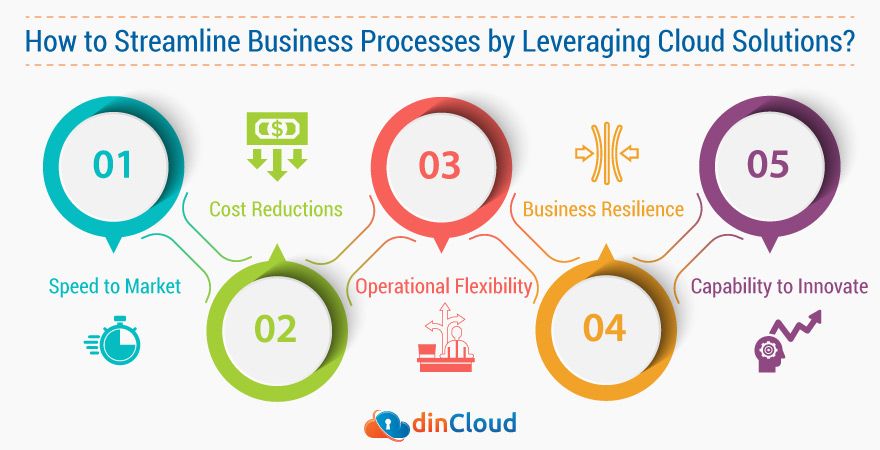
Cloud Computing in Business: Streamlining Operations
- 0
Cloud computing has emerged as a powerful technology that has completely revolutionized the way businesses operate. With its ability to deliver computing resources and services over the internet, cloud computing has become an essential tool in streamlining operations, improving efficiency, and driving growth. In this article, we will delve into the numerous benefits of cloud computing in the business world and explore how it can optimize various aspects of operations.
1. Cost Savings and Scalability
One of the most significant advantages of cloud computing is its cost-effectiveness. Traditionally, businesses had to invest in expensive hardware, software licenses, and maintenance costs to support their IT infrastructure. With cloud computing, all these expenses are significantly reduced or even eliminated. Businesses can now leverage the pay-as-you-go model, where they only pay for the resources and services they use.
Furthermore, cloud computing offers unmatched scalability, allowing businesses to quickly scale their operations up or down according to their needs. This flexibility enables companies to adapt to market fluctuations, seasonal demand, or sudden growth without the need for substantial upfront investments. Cloud computing provides businesses with the agility required to stay competitive in a rapidly changing environment.
2. Enhanced Collaboration and Productivity
Cloud computing enables seamless collaboration among team members, regardless of their location. Through cloud-based tools and applications, employees can work on the same documents, share updates in real-time, and collaborate effectively. This level of connectivity eliminates the need for lengthy email exchanges and ensures that everyone is on the same page, enhancing productivity and reducing misunderstandings.
Additionally, cloud computing empowers businesses to adopt a remote work culture. With the rise of flexible work arrangements, cloud-based solutions allow employees to access company data and applications securely from anywhere in the world. This not only boosts productivity but also provides a better work-life balance, attracting and retaining top talent.
3. Improved Data Security and Disaster Recovery
Data security remains a top concern for businesses of all sizes. Cloud computing offers robust security measures that surpass those implemented in traditional on-premises systems. Cloud service providers employ advanced encryption techniques, multi-factor authentication, and regular security audits to ensure data remains protected at all times.
In addition, cloud computing provides enhanced disaster recovery capabilities. With data stored in the cloud, businesses can easily recover their systems and data in the event of a natural disaster, hardware failure, or human error. Cloud-based backups ensure that critical business information remains intact, minimizing downtime and potential losses.
4. Scalable Infrastructure and High Performance
Cloud computing eliminates the need for businesses to invest in their own physical infrastructure. By leveraging the capabilities of cloud providers, companies can access state-of-the-art hardware, software, and networking resources without incurring hefty upfront costs.
Furthermore, cloud computing delivers outstanding performance. With on-demand computing power and extensive resources, businesses can handle large workloads, process data faster, and run complex applications more efficiently. This high-performance computing ensures organizations can meet customer demands promptly and deliver solutions in a timely manner.
5. Competitive Advantage and Innovation
Cloud computing offers businesses a competitive edge by leveling the playing field. Small and mid-sized enterprises can now access the same cutting-edge technologies as large corporations, without breaking the bank. This enables them to compete on a global scale, deliver innovative products and services, and penetrate new markets.
Moreover, cloud computing fuels innovation, as it provides a flexible and scalable platform for experimentation and development. Businesses can quickly test new ideas, launch prototypes, and gather feedback, allowing them to iterate and improve their offerings at an accelerated pace. Cloud computing has become an indispensable resource for businesses looking to stay ahead in a rapidly evolving tech landscape.
Conclusion
Cloud computing has undeniably transformed the way businesses operate, streamlining operations, and optimizing efficiency. Its cost savings, scalability, enhanced collaboration, improved security, and technological capabilities have made it an invaluable tool in the modern business landscape. By leveraging the power of cloud computing, businesses can not only reduce costs but also gain a competitive advantage, drive innovation, and propel growth. Embracing cloud computing is no longer an option but a necessity for businesses aiming to thrive in a digital-first world.

